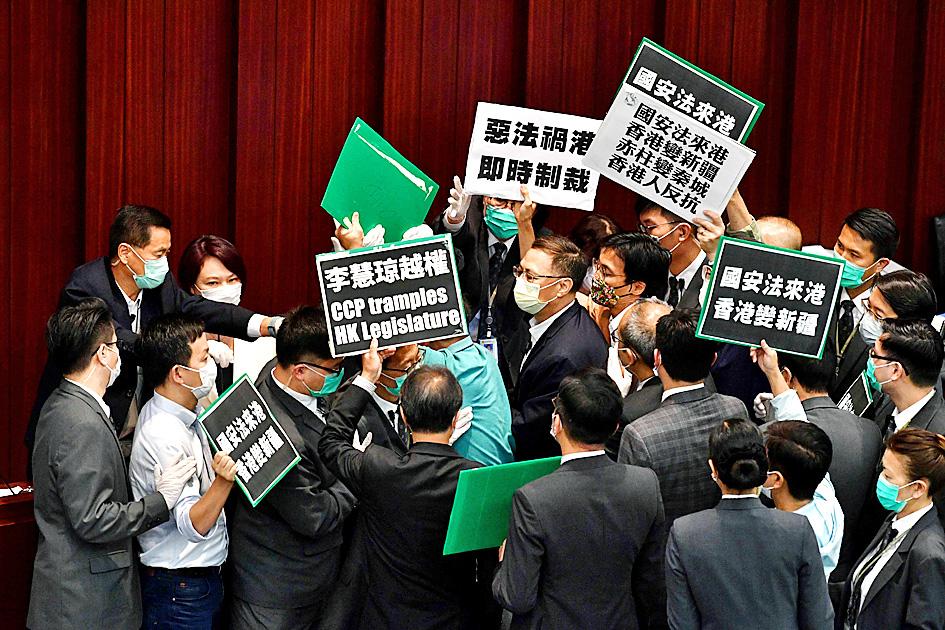Hong Kong pro-democracy campaigners yesterday vowed to take to the streets in protest over what they said was China’s fiercest assault on the territory’s treasured autonomy with its move to impose a security law.
The proposal for the legislation — expected to ban treason, subversion and sedition — was introduced at the opening of the National People’s Congress in Beijing yesterday.
It followed repeated warnings from Chinese leaders that they would no longer tolerate dissent in Hong Kong, which endured seven months of pro-democracy protests last year.

Photo: AFP
“This is the largest nuclear weapon the Chinese Communist Party has used in its mutual destruction of Hong Kong,” said Jimmy Sham (岑子杰), convener of the Civil Human Rights Front, which organized the rally that started last year’s unrest.
Democracy advocate Joshua Wong (黃之鋒) said that China’s message to the protesters was clear.
“Beijing is attempting to silence Hong Kongers’ critical voices with force and fear,” Wong wrote on Twitter, while also expressing defiance. “HKers will not scare off in the face of wolf warrior policy.”
Hong Kong has been allowed a limited form of autonomy since returning from British to Chinese rule in 1997, with those unique freedoms enshrined under a “one country, two systems” agreement.
However, a huge pro-democracy movement has built in the face of fears that China has been steadily eroding those freedoms.
The Chinese Communist Party yesterday made it clear that the planned law was aimed at quashing the democracy movement.
“We must take powerful measures to lawfully prevent, stop and punish them,” National People’s Congress Standing Committee Vice Chairman Wang Chen (王晨) said, referring to “anti-China” forces.
Article 23 of Hong Kong’s Basic Law states that the territory must enact a law to prohibit “treason, secession, sedition [and] subversion” against the Chinese government, but the clause has never been implemented due to opposition from Hong Kongers fearful it would destroy their civil rights.
An attempt to have Article 23 pass the Hong Kong Legislative Council in 2003 was shelved after about 500,000 people took to the streets in protest against it.
China’s move would circumvent the Hong Kong Legislative Council by having it imposed by Beijing.
Wang said Hong Kong’s delays in implementing the security law had forced the Chinese leadership to take action.
“More than 20 years after Hong Kong’s return, however, relevant laws are yet to materialize due to the sabotage and obstruction by those trying to sow trouble in Hong Kong and China at large, as well as external hostile forces,” he said.
The US reacted swiftly, with US Department of State spokeswoman Morgan Ortagus warning that imposing such a law would be “highly destabilizing, and would be met with strong condemnation from the United States and the international community.”

The CIA has a message for Chinese government officials worried about their place in Chinese President Xi Jinping’s (習近平) government: Come work with us. The agency released two Mandarin-language videos on social media on Thursday inviting disgruntled officials to contact the CIA. The recruitment videos posted on YouTube and X racked up more than 5 million views combined in their first day. The outreach comes as CIA Director John Ratcliffe has vowed to boost the agency’s use of intelligence from human sources and its focus on China, which has recently targeted US officials with its own espionage operations. The videos are “aimed at

STEADFAST FRIEND: The bills encourage increased Taiwan-US engagement and address China’s distortion of UN Resolution 2758 to isolate Taiwan internationally The Presidential Office yesterday thanked the US House of Representatives for unanimously passing two Taiwan-related bills highlighting its solid support for Taiwan’s democracy and global participation, and for deepening bilateral relations. One of the bills, the Taiwan Assurance Implementation Act, requires the US Department of State to periodically review its guidelines for engagement with Taiwan, and report to the US Congress on the guidelines and plans to lift self-imposed limitations on US-Taiwan engagement. The other bill is the Taiwan International Solidarity Act, which clarifies that UN Resolution 2758 does not address the issue of the representation of Taiwan or its people in

US Indo-Pacific Commander Admiral Samuel Paparo on Friday expressed concern over the rate at which China is diversifying its military exercises, the Financial Times (FT) reported on Saturday. “The rates of change on the depth and breadth of their exercises is the one non-linear effect that I’ve seen in the last year that wakes me up at night or keeps me up at night,” Paparo was quoted by FT as saying while attending the annual Sedona Forum at the McCain Institute in Arizona. Paparo also expressed concern over the speed with which China was expanding its military. While the US

SHIFT: Taiwan’s better-than-expected first-quarter GDP and signs of weakness in the US have driven global capital back to emerging markets, the central bank head said The central bank yesterday blamed market speculation for the steep rise in the local currency, and urged exporters and financial institutions to stay calm and stop panic sell-offs to avoid hurting their own profitability. The nation’s top monetary policymaker said that it would step in, if necessary, to maintain order and stability in the foreign exchange market. The remarks came as the NT dollar yesterday closed up NT$0.919 to NT$30.145 against the US dollar in Taipei trading, after rising as high as NT$29.59 in intraday trading. The local currency has surged 5.85 percent against the greenback over the past two sessions, central